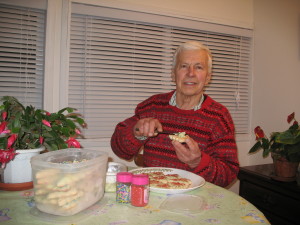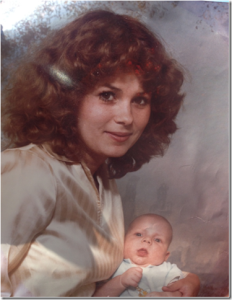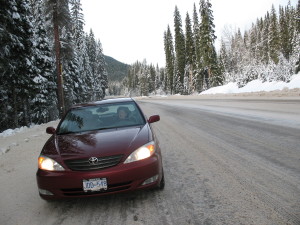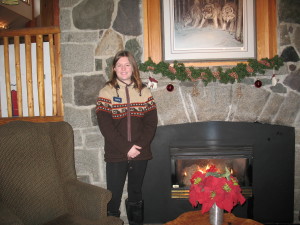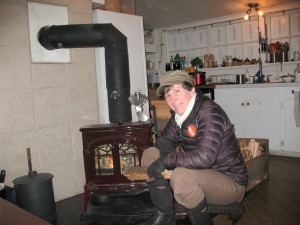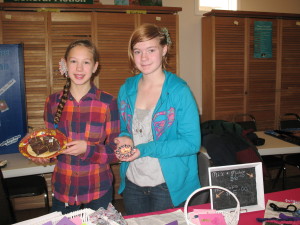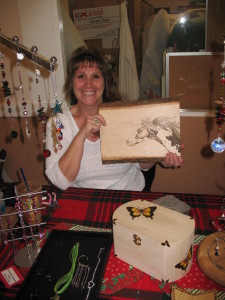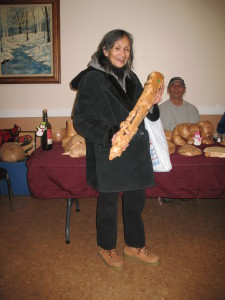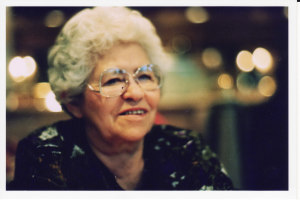On a visit to Mountain Prison near Agassiz some years ago, I encountered a number of round faced men, clad in drab grey prison  garb. They were sitting on hard wooden benches set against long metal huts. Except for occasionally inserting a cigarette between their lips, they sat still and lifeless as sand sculptures on a forgotten beach. I approached them and asked, “what are you all waiting for?”
garb. They were sitting on hard wooden benches set against long metal huts. Except for occasionally inserting a cigarette between their lips, they sat still and lifeless as sand sculptures on a forgotten beach. I approached them and asked, “what are you all waiting for?”
An elderly man with a balding scalp roused himself and responded quite amicably, “we’re waiting for the ringing of the lunch bell. Then we can go in and eat.”
On subsequent visits, I saw the men there many times, often arriving long before the bell summoned them. For some, meals were the most significant events in their day. In time I understood that prison life had fostered a toxic lethargy in them and most had no realistic goals or vision for anything better. They seemed not to grasp they could be preparing for the rigours of life awaiting them beyond the high chain link fence around the prison. Inside the fence they were able to blame others for their plight. Outside they would need to deal with reality. They feared reality. Although they admitted it only rarely, some felt safe only within the fence. They reminded me of T.S. Eliot’s “Hollow Men.”
Seeing these men was a reminder to me that it is in the storms of life that we grow strong. I realized how true this is later when I was 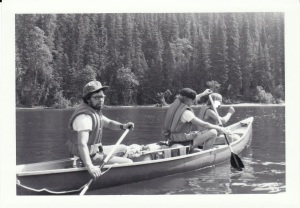 working for the One Way Adventure Foundation in Hedley. Each summer we took small groups of Young Offenders on a Bowron Lakes canoe expedition. The trip consists of portaging, canoeing on lakes and rivers, and camping in a pristine wilderness. Once on the lakes, we had no means of communicating with anyone outside our group. If a canoe began to leak, we had to deal with it.
working for the One Way Adventure Foundation in Hedley. Each summer we took small groups of Young Offenders on a Bowron Lakes canoe expedition. The trip consists of portaging, canoeing on lakes and rivers, and camping in a pristine wilderness. Once on the lakes, we had no means of communicating with anyone outside our group. If a canoe began to leak, we had to deal with it.
On one trip our crew consisted of 3 leaders and 9 adolescent boys travelling in 6 sturdy, Frontiersman canoes. The youths came primarily from poorly functioning homes. They generally arrived at our campus with a distinctly uncooperative attitude, often with a swagger. They attempted to portray themselves as tough and street smart. Having no chain link fence to protect them from life’s harsh realities, they had donned a mask to hide their sense of insecurity.
We wanted to expose them to mosquitoes, horse flies, paddling or portaging all day, sometimes in incessant rain. We considered it important that they feel the discomfort of a canoe yoke digging into their shoulders on portages. The experience would plant a significant memory in their psyche. A memory of grappling with unaccustomed and unexpected challenges, and discovering they had the stamina to persevere to the end. They would see that we, the leaders, were also being ravaged by the insects and the elements. Masks would begin to slip as we all contended with a reality we could not ignore.
It was an overcast Thursday morning when our little contingent emerged from the fast flowing, dangerous waters of the Cariboo River onto Lanezi Lake. A powerful headwind was already whipping up waves. Spray blew into our faces and we could scarcely move. Our canoes bobbed like corks on the restless water. Because the towering mountains descended on either side to the edge of the lake, we could find no refuge there. Fear gripped the boys. They were city youths and had never paddled in turbulent water like this.
Fear in their voices concerned me. It was quickly eroding their inner strength. I needed to do something to give them confidence. I started singing, “row, row, row your boat, gently down the stream.” Initially they looked at me as though doubting my sanity. Sensing my confidence, a couple of the older boys began singing with me. Their voices weren’t much better than mine but in the blowing wind, it didn’t matter.
“Row, row, row your boat.” Soon we were all singing and whooping and paddling like mad voyageurs. Suddenly, we were lusty and strong and free.
I looked at the 2 straining, sweating boys in the canoe closest to me and both of them grinned broadly. They were having too much fun to be scared. Three hours later, in the safety of our rustic camp, with tents set up, a camp fire warming us, and hot food in our bellies, we knew we had conquered our fears.
Now, with a new year dawning, this is a good time for all of us to decide we won’t be content to sit on a bench mindlessly waiting for our next meal. This is a good time to think about how we will respond to the storms of life that may descend on us in 2015.




